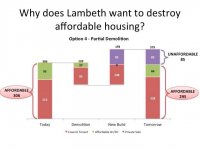Re: your point 2 - I don't necessarily think that it is interest rate so much as availabilty of credit. Effective demand is a function of ability an willingness to pay - if you give people the opportunity to borrow higher income multiples then prices will rise. Interest rate rises may work to stabilise this a few years down the line, but don't control it directly. When you could only borrow 3x the family income (going back 20-30 years ago), things were much more stable irrespective of interest rates.
Given that our economy is based on house prices and banking, I have a horrible feeling that in a few years we'll see 7x income multiples and 40 year mortgages.




